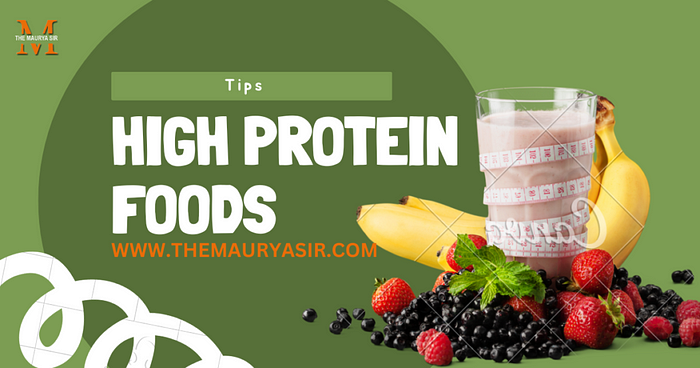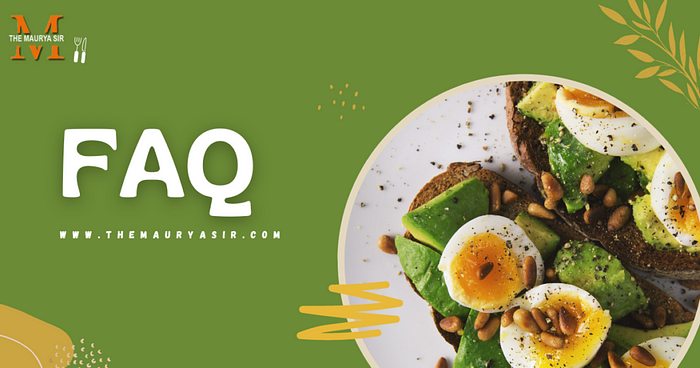Top 10 High-Protein Foods for a Healthy Diet
Are you trying to figure out how to increase the protein in your diet? Building and mending tissues, as well as keeping strong muscles and a robust immune system, all depend on protein. This post will discuss 10 high-protein foods that are simple to include in your diet.
Table of Contents
- Introduction
- Why is protein important?
- How much protein do you need?
- High protein foods for a healthy diet
- Eggs
- Greek yogurt
- Chicken breast
- Tuna
- Lentils
- Quinoa
- Almonds
- Cottage cheese
- Broccoli
- Whey protein powder
- Conclusion
- FAQs
Introduction
One of the most vital nutrients for our bodies is protein. It is necessary for maintaining strong muscles and a strong immune system as well as for constructing and mending tissues. There are many high-protein plant-based options available, despite the fact that many people identify protein with goods derived from animals. This post will discuss 10 high-protein foods that are simple to include in your diet.
Why is Protein Important?
Protein is necessary for a variety of vital bodily processes. It aids in the development and repair of tissues, such as muscles, bones, and organs. Protein is necessary for the production of antibodies that can fight against infections and illnesses, which is another factor in maintaining a robust immune system.
Protein is crucial for controlling weight as well. It assists in keeping your content full, which can help you avoid overeating and harmful snacking. This is because protein stays in your stomach longer and makes you feel fuller for a longer period of time than carbohydrates or fats do.
Related Article:
15 Essential Pregnancy Tips for a Healthy and Happy Pregnancy
How Much Protein do you need?
Your age, gender, weight, and level of activity are just a few variables that affect how much protein you require. Adults should generally try to ingest 0.8 grammes of protein per kilogramme of body weight each day. Athletes and those who exercise frequently might require more, though.
High-Protein Foods for a Healthy Diet

Here are 10 High Protein Foods that you can simply include in your diet:
1. Eggs:
With roughly 6 grammes of high-quality protein in each big egg, eggs are a fantastic source of protein. They are also a good source of vitamins and minerals, including vitamin D and choline, both of which are vital for the health of the brain.
2. Greek Yoghurt:
With about 17 grammes of protein in each 6-ounce serving, Greek yoghurt is another excellent source of protein. It also has low-fat content and a lot of calcium, both of which are crucial for strong bones.
3. Chicken Breast:
With about 31 grammes of protein per 3-ounce serving, chicken breast is a lean protein source. It is a fantastic choice for weight loss because it is low in calories, fat, and fat content.
4. Tuna:
With about 25 grammes of protein per 3-ounce serving, tuna is a fantastic source of protein. Omega-3 fatty acids, which are crucial for heart health, are also abundant in them.
5. Lentils:
With about 18 grammes of protein per cup, lentils are a fantastic plant-based protein source. They contain a lot of fibre, which can support satiety by regulating digestion.
6. Quinoa:
With about 8 grammes of protein per cup, quinoa is another excellent plant-based protein source. Additionally, it contains significant amounts of vitamins, minerals, and fibre.
7. Almonds:
The tree nut known as the almond is rich in protein, fibre, good fats, and a number of other vital components. They include 6 grammes of plant-based protein in every 28 gramme serving, making them a fantastic source of this nutrient.
8. Cottage Cheese:
Low in fat and high in protein is the type of cheese known as cottage cheese. It is a great option for those trying to enhance their protein consumption because it has roughly 13 grammes of protein per 100 grammes.
9. Broccoli:
A cruciferous vegetable that is rich in protein, vitamins, and minerals is broccoli. For vegetarians and vegans seeking plant-based protein sources, broccoli that has been sliced contains roughly 2.6 grammes of protein per cup.
10. Whey Protein Powder:
Because it is a quick and easy way to enhance protein intake, whey protein powder is a well-liked dietary supplement among athletes and fitness enthusiasts. All nine of the essential amino acids are present in whey protein, which is a milk byproduct. 20–25 grammes of protein are typically included in one scoop of whey protein powder.
Conclusion:
High-protein foods are essential for keeping strong bones and teeth, rebuilding damaged muscular tissue, and boosting the immune system. You may help yourself fulfil your daily protein requirements by including items like almonds, cottage cheese, broccoli, and whey protein powder in your diet.
Also Asked by People

Can I get enough protein from plant-based sources?
You can obtain sufficient protein from plant-based sources, yes. Whole grains, legumes, nuts, and seeds are all excellent sources of plant-based protein.
Is it safe to consume whey protein powder?
Most people can normally consume whey protein powder without any problems. Whey protein powder should be avoided by anyone with lactose intolerance or milk allergies, who should instead select a lactose-free or plant-based protein powder alternative.
How much protein do I need in a day?
Your daily protein requirements will vary depending on your age, gender, weight, and degree of activity. According to general guidelines, 0.8 grammes of protein per kilogramme of body weight should be consumed daily. However, people who exercise vigorously or who are athletes might need additional protein.


.png)

Comments
Post a Comment